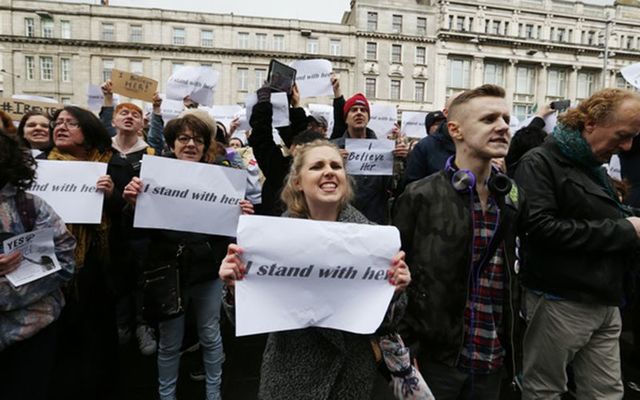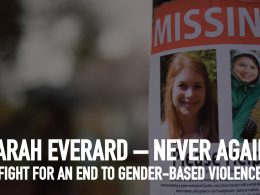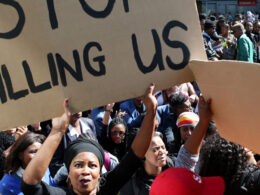By Emma Quinn
On 15 October a popular social media post in Ireland captured the prevalence of gender violence. The image showed nine headlines appearing across the mainstream media on that day including the sexual abuse of a child, intimate partner violence, an attack and rape of a woman in a nightclub and an internationally famous “sports star” who continued to “party” after allegedly assaulting a woman.
On average 10 women have died violently every year since 1996. An EU study showed Ireland had the second highest rate in the EU of women who avoid places or situations for fear of being assaulted.
Overall it is estimated that one in four women living in Ireland will experience violence. The “Call It Out” campaign’s research shows that the LGBTQ+ community also continue to experience widespread verbal, physical and sexual harassment . One in three teenage girls experience sexual violence.
Essential frontline services for those affected are chronically underfunded. Swingeing cuts implemented by the government during years of brutal austerity have never been reversed. Ruth Coppinger, TD for the Socialist Party/Solidarity, challenged Taoiseach Leo Varadkar on how a refuge and outreach service in the constituency they both represent was forced to turn away three times more people than they were able to help last year, impacting up to 500 families.
The question of safe and secure accommodation is obviously essential to any person living in an abusive situation. The escalating housing crisis in Ireland is a stark reminder that capitalism cannot cover the basic needs of huge sections of the working class. The obvious question hangs in the air, how can you leave when you have nowhere to go? Many women and children who leave crisis services face homelessness and will join the almost 11,000 currently living in hotels and hostels.
Exploitation has always been part and parcel of the private rented sector. This includes sexual exploitation but because of the housing crisis, the balance of power has dramatically shifted even more to landlords. Ruth Coppinger recently publicly exposed the prevalance of sexual harassment by landlords of women renters. Women who are recipients of state aid for rent which includes many poverty-stricken single parents, are easy prey for predatory landlords.
Workplaces are not safe from harassment either. In Ireland, women are twice as likely to be paid the minimum wage as men and make up the majority of low paid and precarious workers. In industries where low pay and poor conditions are rife, so too is sexual harassment. A survey conducted by Dr. Deirde Curran of NUI Galway concluded that 76% of hospitality workers had “sometimes” or “often” experienced verbal abuse and the overall findings indicated widespread sexual harassment in Irish restaurants, cafes, pubs and hotels. Dr. Curran described how “I have been researching for three decades and never before conducted research that has kept me awake at night. These people are crying out for a voice and protection”.
Gender based violence and poverty are key contributing factors to the stress and anxiety that disproportionately affect women. An online poll by HER.ie showed that 74% of respondents were experiencing mental health issues, and a heartwrenching trend has emerged, particularly in hard-pressed working class communites, where the number of young mothers committing suicide is at an unprecedented level.
The phenomenal Repeal referendum victory, which removed a constitutional ban on abortion and won the right to choose up to 12 weeks, was driven from below with working class women in communities being essential and passionate advocates for “yes”. After repeal, the predominant sentiment amongst working class women is one of “unfinished business”. This holds a huge potential power to fuel struggle, with the need for public housing and childcare to the fore. This is indicated by a new closed Facebook group to end homelessness that accumulated 48,000 members in just ten days and has seen thousands of mainly women post their horrific personal experiences of homelessness and the impact it has had on them and their families, reminiscent of #MeToo. Their stories are inspiring much support and solidarity, which is adding momentum to a protest this spontaneous online group has called for December.
The Republic of Ireland has one of the highest rates of “ultra-high net worth individuals” in the world. The fact is that the wealth and resources already exist to be able to provide safe homes and secure places of work that are free from abuse and harassment, to pay a living wage, to fund quality community based childcare, public healthcare, and programmes that tackle sexism and homophobia, but those resources will not be given over by the political establishment or bosses and will have to be fought. Such a working class movement with women playing a vital role, would challenge sexist and misogynistic attitudes, and crucially aim to seize the key wealth and resources out of the hands of the capitalist elite. By taking the key levers of the economy into public ownership under working class control, we can begin to build a socialist society that is based on solidarity, human need and dignity for all.












